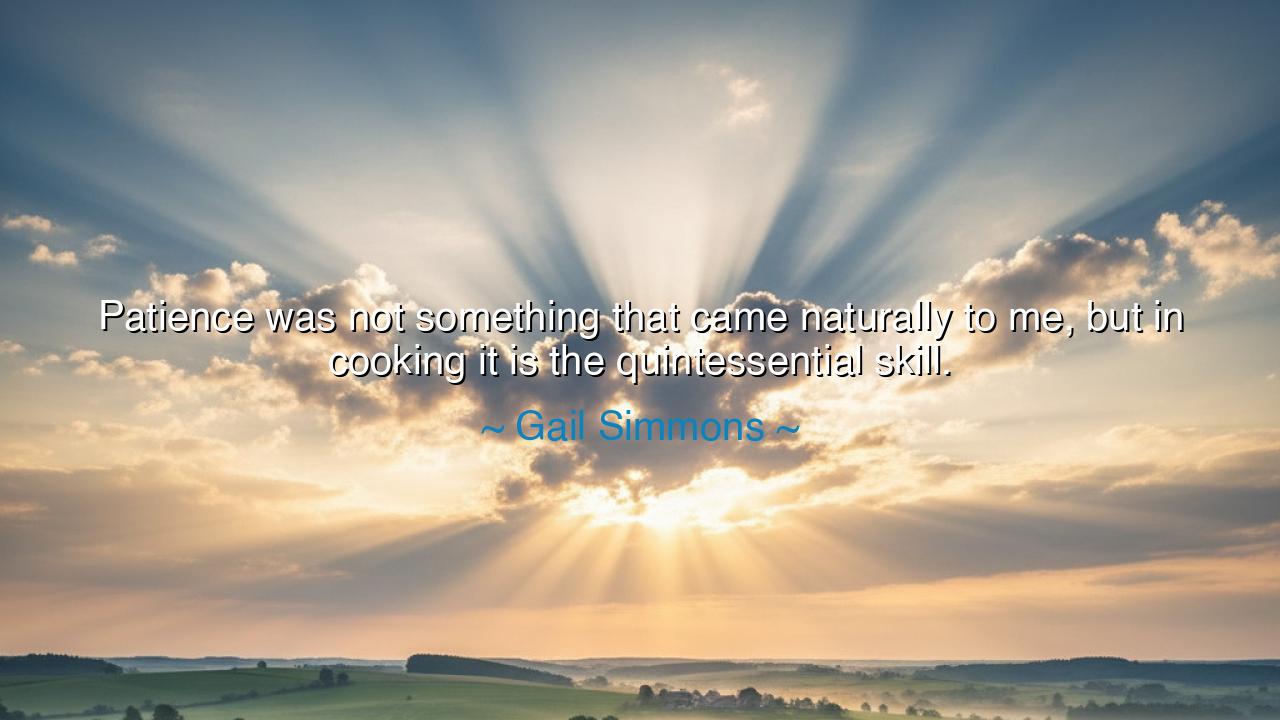
Patience was not something that came naturally to me, but in
Patience was not something that came naturally to me, but in cooking it is the quintessential skill.






Gail Simmons, a master of taste and a guide in the world of cuisine, once confessed with humility: “Patience was not something that came naturally to me, but in cooking it is the quintessential skill.” In this statement lies a truth as rich as any banquet. For she reveals both the struggle of the human spirit against its restless impulses, and the necessity of patience in the art of transformation. Cooking, she reminds us, is not merely the assembling of ingredients, but the waiting, the tending, the faith that time itself is the hidden spice.
The meaning of her words is clear: while many arts may thrive on speed and brilliance, cooking demands stillness, attentiveness, and restraint. A flame too hot will scorch, a hand too hasty will ruin, and a mind too restless will rob the dish of its fullness. It is patience that allows bread to rise, patience that allows flavors to marry, patience that turns raw flesh into tender nourishment. The cook becomes not merely one who stirs and chops, but one who learns to submit to the quiet law of time, the unseen master of the kitchen.
History itself offers us a feast of examples. Consider the monks of medieval Europe, who brewed beer and aged cheeses not in days but in years. Their legacy endures because they honored the long wait, never rushing what nature and craft required. Or recall the art of Japanese sushi, where apprentices may spend years perfecting the cutting of fish or the preparation of rice before they are trusted with the final work. Their greatness lies not in haste, but in patience—discipline carried through countless small acts until mastery is achieved.
Simmons’ admission that patience did not come naturally speaks to all of us. For in truth, few are born with it. The human heart longs for quick results, immediate gratification, the harvest without the season of growth. Yet cooking, like life itself, teaches us that true flavor cannot be rushed. Just as the soil must rest before it yields, and the grape must ripen before it becomes wine, so must we learn to wait, to endure, to trust the process that shapes all good things.
The ancients told stories to teach this lesson. One such tale is of Penelope, wife of Odysseus, who waited twenty years for her husband’s return. Through patience, she preserved not only her home but her honor. Her weaving, begun by day and undone by night, became a symbol of her endurance. Cooking, though humbler in scale, is a mirror of the same truth: what is crafted with patience endures; what is rushed falls apart.
And so the wisdom of Simmons’ words is this: patience, though hard-won, becomes the soul of every art that nourishes. In cooking, it is visible; in life, it is universal. The mother raising a child, the artist shaping a vision, the leader guiding a people—all require the same discipline: to hold steady, to trust the unseen, to resist the urge to force what must unfold.
Therefore, O listener, take this lesson into your own hands: cultivate patience, even if it is foreign to you. Practice it in the kitchen, where the low simmer and the long rise will teach you more than any book. Practice it in life, where every goal worth reaching requires endurance. Do not despise the waiting, for in the waiting, transformation occurs. And remember always: as food becomes nourishment only through time, so the soul becomes wisdom only through patience.
Thus, Simmons’ words endure as a teaching for all: patience is not born in us, but forged in us. And once forged, it becomes the quintessential skill, not only in cooking, but in the art of living itself.






AAdministratorAdministrator
Welcome, honored guests. Please leave a comment, we will respond soon